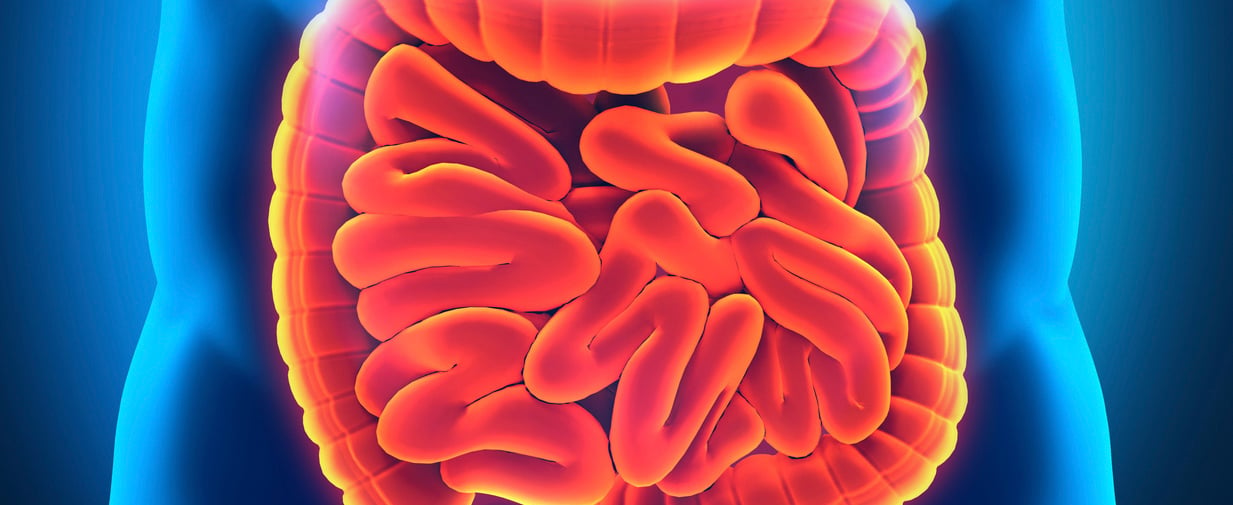Last year, the integrin inhibitor or leukocyte migration inhibitor vedolizumab was approved in Switzerland for Crohn’s disease and ulcerative colitis. In addition, biosimilars for infliximab have entered the market. Furthermore, a topically active budesonide preparation has also been approved for ulcerative colitis. For ulcerative colitis, the JAK kinase inhibitor tofacitinib, available as an oral drug, is likely to be approved. For Crohn’s disease, approval is expected for the anti-IL23 antibody ustekinumab. These new compounds need to be incorporated into therapy algorithms. It is important to know their properties in order to provide patients with optimal therapy.
For many years, we had a number of standard therapeutics available for inflammatory bowel disease. In ulcerative colitis, these included 5-aminosalicylic acid preparations, steroids, immunosuppressants, and anti-TNF antibodies. In Crohn’s disease, the drugs were topical steroids, systemic steroids, immunosuppressants such as azathioprine and methotrexate, and also TNF inhibitors. Last year, additional drugs were approved in Switzerland for Crohn’s disease and ulcerative colitis, and more are expected next year. These innovative therapies should soon find application in practice,
as they can improve the lives of patients with IBD.
Budesonide MMX in ulcerative colitis
Budesonide is a topically active steroid preparation that has a 90% first-pass effect in the liver. That is, budesonide acts locally in the intestinal mucosa like a steroid preparation, but has few systemic side effects due to the higher first-pass effect.
Two budesonide preparations, Budenfalk® and Entokort®, were already available for the treatment of Crohn’s disease. The corresponding tablets released budesonide primarily in the terminal ileum and ascending colon. In addition, for ulcerative colitis and, when appropriate, left-sided colon Crohn’s, budesonide was available as enemas and foams for rectal therapy.
In 2016, a budesonide MMX preparation (Cortiment®) was now approved. The MMX formulation allows budesonide to be released throughout the colon. So you can now use an oral budesonide preparation for ulcerative pancolitis or for left-sided ulcerative colitis. The corresponding studies showed a significant positive effect compared to placebo [1–3]. In the aforementioned pivotal studies, clinical and endoscopic remission was observed in 2.4 to 3.9 times more patients compared to placebo when treated with budesonide MMX (CORE I and CORE II, respectively). Furthermore, no clinically relevant side effects were observed over a period of 8 weeks. Therefore, in all mild to moderate courses of ulcerative colitis, budesonide MMX should be considered as a therapeutic option even before the use of systemic steroids.
Leukocyte migration inhibitors (vedolizumab, Entyvio) in Crohn’s and colitis.
In March 2016, Entyvio® (vedolizumab) was approved for the treatment of ulcerative colitis and Crohn’s disease. Vedolizumab is an antibody directed against an adhesion molecule on activated lymphocytes. The β7-integrin or the α4/β7-integrin binds to MadCAM, which is expressed only on vascular endothelial cells in the intestine. Thus, vedolizumab is a gut-specific leukocyte migration inhibitor. As expected, the clinical trials showed only low rates of side effects [4,5]. In addition, it showed encouraging response and remission rates, significantly better than placebo, for both ulcerative colitis and Crohn’s disease [4,5].
In the clinical trials, an endpoint was chosen for induction therapy at 6 weeks. However, this appears to be very early for vedolizumab. The leukocytes located in the mucosa are not inhibited in their function. They continue to produce pro-inflammatory cytokines and second messengers, thus continuing to contribute to inflammation. Thus, vedolizumab is not an immunosuppressant. It only prevents reactivated lymphocytes from migrating into the intestinal mucosa. Already existing activated immune cells will further drive the immune response. Since they live on average about 100 days, therapeutic success of vedolizumab can be expected after 6 to 12 weeks.
Indeed, several studies besides the pivotal study, e.g. by Sands et al, showed that after 10 weeks there was a significantly improved effect of vedolizumab compared to the 6-week interval [6]. So you need some patience when initiating vedolizumab therapy. If necessary, vedolizumab must be combined with steroid therapy for remission induction.Real-life experience data in Germany and France suggest that a positive effect can be achieved in over 70% of patients [7,8]. Mucosal healing can be achieved after some time in just under half of patients.
Therefore, it is debated whether vedolizumab should not be used as a first-line biologic in ulcerative colitis, as remission rates and thus efficacy are similar to those for TNF inhibitors, but fewer side effects are recorded. In particular, since no immunosuppression is induced, there are significantly fewer infections. However, it should be taken into account that in the presence of extraintestinal manifestations such as pyoderma gangraenosum, erythema nodosum or arthritis of the small joints, vedolizumab is rather unsuitable. Because it is gut-specific, joint manifestations are not addressed by vedolizumab. In the future, further integrin inhibitors can be expected to be approved in Europe and Switzerland. However, it will be some time before that happens.
JAK kinase inhibitors in ulcerative colitis.
Positive data are available for the Janus kinase inhibitor tofacitinib from a phase II study in ulcerative colitis [9]. A clinical response was observed at 8 weeks in 32%, 48%, 61%, and 78% of patients at doses of 0.5 mg (p=0.39), 3 mg (p=0.55), 10 mg (p=0.10), and 15 mg (p<0.001), respectively, compared with placebo (42%) [9]. Clinical remission (defined as Mayo score <2, without subscore >1) at 8 weeks was observed in 13%, 33%, 48% and 41% of patients at doses 0.5 mg (p=0.76 ), 3 mg (p=0.01), 10 mg (p<0.001) and 15 mg (p<0.001), respectively, versus placebo (10%). The main side effect observed was a dose-dependent increase in HDL cholesterol. Meanwhile, a Phase III study has also been successfully completed, demonstrating a significant effect for tofacitinib.
Therefore, it is expected to be available as an oral medication for patients in Europe and Switzerland in the near future. The efficacy of tofacitinib in ulcerative colitis appears encouraging. What makes it special is that, as mentioned, it can also be taken as an oral medication. Tofacitinib (Xeljanz®) has already been approved in Switzerland for rheumatoid arthritis and there is positive practical experience. The side effect rate seems to be low. It may be possible to introduce tofacitinib before or instead of azathioprine in the treatment of ulcerative colitis. The effect appears to be more rapid than with the immunosuppressant azathioprine, immunosuppression is less pronounced, and fewer infections are observed. Approval for tofacitinib is possible in 2017. Additional JAK kinase inhibitors are in clinical development.
Ustekinumab (Stelara®) for Crohn’s disease
A positive effect of ustekinumab for Crohn’s disease was shown as early as 2008 [10]. However, it took many years for a phase III trial to demonstrate a clearly significant effect for ustekinumab for the treatment of Crohn’s disease [11, 12]. Stelara® primarily induces remission in Crohn’s disease when initially administered intravenously. Previous studies envisaged subcutaneous application, but this still has an insufficient therapeutic effect in the induction phase. In the current studies, Stelara® was used intravenously at a concentration of 6 mg/kg body weight. This dosage was much higher than the subcutaneous dosage in previous studies. Remission maintenance was performed with 130 mg subcutaneously every 8 weeks. Maintenance therapy with ustekinumab resulted in significantly higher clinical remission rates (41.7% vs. 27.4%, p=0.03) and clinical response (69.4% vs. 42.5%, p<0.001) at 22 weeks compared to placebo. Serious infections occurred in 7 patients (6 patients with ustekinumab) during induction, and in 11 patients during remission maintenance (4 patients with ustekinumab). Thus, Stelara® does not appear to have a very strong immunosuppressive effect.
Initial experience in rheumatology has been positive and suggests that it can be used well. Initially, it looked like Crohn’s disease patients in particular would respond to ustekinumab who had prior failure to anti-TNF therapy. In the meantime, results suggest that the response to Stelara® is independent of whether anti-TNF therapy has already been administered.
Ustekinumab neutralizes a subunit of the cytokines IL-23 and IL-12, each of which consists of two proteins. Initially, it was assumed that the an-tagonism against IL12 was the actual functional mechanism. Meanwhile, it can be assumed that neutralization of IL23 essentially contributes to anti-inflammatory functions. Additional antibodies against another subunit of interleukin 23 (p19) are in clinical trials at the company. It is likely that ustekinumab will not remain the only substance from the IL23 inhibitor family to be approved for Crohn’s disease and possibly ulcerative colitis.
Lecithin for ulcerative colitis
Another innovative therapeutic approach is the administration of lecithin in ulcerative colitis. Phosphatidylcholine (or lecithin) is a substance from the phospholipid class and a natural component of intestinal mucus. It is released into the intestinal lumen in the lower small intestine and supports the barrier function of the mucus layer on the intestinal wall so that few bacterial components and toxins can reach the surface of the mucosa [13]. It forms a protective layer on the mucous membrane, so to speak. In patients with ulcerative colitis, the concentration of this protective phosphatidylcholine in the mucus layer of the colon is reduced by up to 70% [14]. An initial multicenter study demonstrated a beneficial effect of lecithin in mild to moderate 5-ASA refractory ulcerative colitis [15]. A pivotal study is currently underway to confirm the positive results.
Literature:
- Rubin DT, et al: Budesonide Foam Has a Favorable Safety Profile for Inducing Remission in Mild-to-Moderate Ulcerative Proctitis or Proctosigmoiditis. Dig Dis Sci 2015; 60(11): 3408-17.
- Travis SP, et al: Once-daily budesonide MMX in active, mild-to-moderate ulcerative colitis: results from the randomised CORE II study. Gut 2014; 63(3): 433-41.
- Sandborn WJ, et al: Once-daily budesonide MMX(R) extended-release tablets induce remission in patients with mild to moderate ulcerative colitis: results from the CORE I study. Gastroenterology 2012; 143(5): 1218-26 e1-2.
- Sandborn WJ, et al: Vedolizumab as induction and maintenance therapy for Crohn’s disease. N Engl J Med 2013; 369(8): 711-21.
- Feagan BG, et al: Vedolizumab as induction and maintenance therapy for ulcerative colitis. N Engl J Med 2013; 369(8): 699-710.
- Sands BE, et al: Effects of vedolizumab induction therapy for patients with Crohn’s disease in whom tumor necrosis factor antagonist treatment failed. Gastroenterology 2014; 147(3): 618-627 e3.
- Stallmach A, et al: Vedolizumab provides clinical benefit over 1 year in patients with active inflammatory bowel disease – a prospective multicenter observational study. Aliment Pharmacol Ther, 2016.
- Amiot A, et al: Effectiveness and Safety of Vedolizumab Induction Therapy for Patients With Inflammatory Bowel Disease. Clin Gastroenterol Hepatol, 2016.
- Sandborn WJ, et al: Tofacitinib, an oral Janus kinase inhibitor, in active ulcerative colitis. N Engl J Med 2012; 367(7): 616-24.
- Sandborn WJ, et al: A randomized trial of ustekinumab, a human interleukin-12/23 monoclonal antibody, in patients with moderate-to-severe Crohn’s disease. Gastroenterology 2008; 135(4): 1130-41.
- Sandborn WJ, et al: O-001 A Multicenter, Double-Blind, Placebo-Controlled Phase3 Study of Ustekinumab, a Human IL-12/23P40 mAB, in Moderate-Service Crohn’s Disease Refractory to Anti-TFNalpha: UNITI-1. Inflamm Bowel Dis 2016; 22 Suppl 1: S1.
- Sandborn WJ, et al: Ustekinumab induction and maintenance therapy in refractory Crohn’s disease. N Engl J Med 2012; 367(16): 1519-28.
- Stremmel W, et al: Phosphatidylcholine (lecithin) and the mucus layer: Evidence of therapeutic efficacy in ulcerative colitis? Dig Dis 2010; 28(3): 490-6.
- Ehehalt R, et al.: Phosphatidylcholine and lysophosphatidylcholine in intestinal mucus of ulcerative colitis patients. A quantitative approach by nanoElectrospray-tandem mass spectrometry. Scand J Gastroenterol 2004; 39(8): 737-42.
- Karner M, et al: First multicenter study of modified release phosphatidylcholine “LT-02” in ulcerative colitis: a randomized, placebo-controlled trial in mesalazine-refractory courses. Am J Gastroenterol 2014; 109(7): 1041-51.
HAUSARZT PRAXIS 2016; 11(11): 12-15











